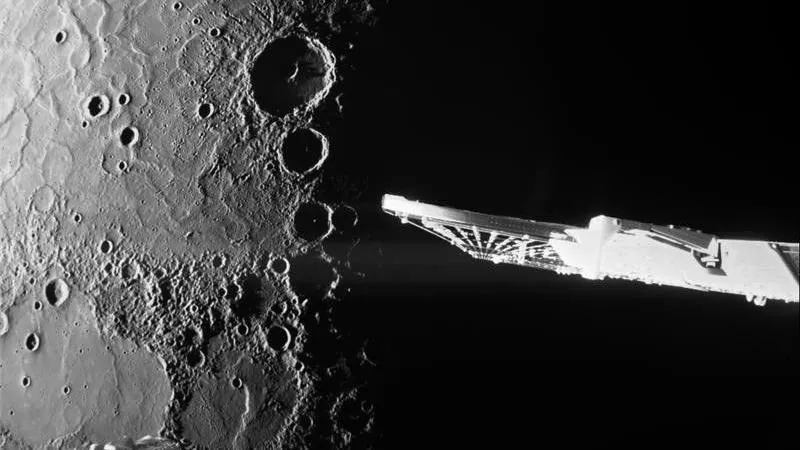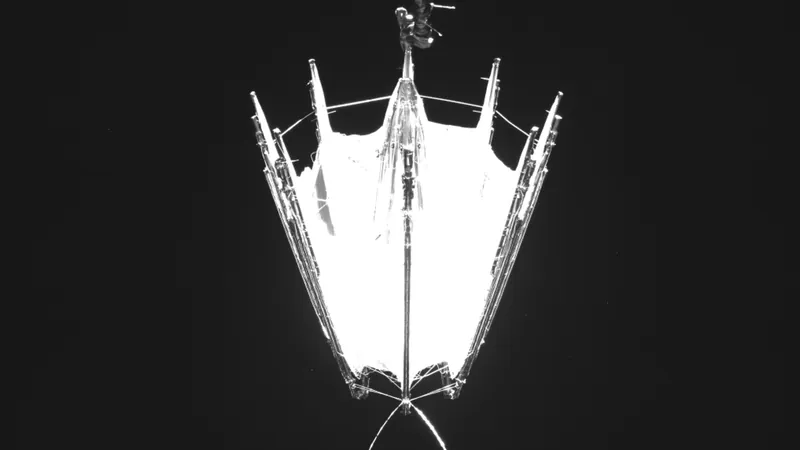
New Stunning Images of Mercury Captured by UK Spacecraft!
2025-01-09
Author: John Tan
Exciting Developments in Solar System Exploration
A spacecraft designed and built in the UK has recently captured remarkable new images of Mercury as it undertook its sixth and final flyby before entering the planet's orbit in 2026.
BepiColombo Overview
The spacecraft, known as BepiColombo, was constructed by Airbus in Stevenage and launched into space back in 2018. This ambitious mission is a collaboration between the European Space Agency (ESA) and the Japan Aerospace Exploration Agency (JAXA). BepiColombo consists of two separate satellites that will work together to gather vital data about Mercury for at least a year once in orbit. To survive the extreme heat from the sun, the spacecraft is equipped with specialized thermal shielding.
Latest Flyby Achievements
During this latest flyby, the spacecraft traversed just 295 kilometers (183 miles) above Mercury's surface, capturing breathtaking views of the planet’s north poles illuminated by sunlight. These close-up images are not just visually stunning but will also serve to enhance our understanding of Mercury's surface and composition.
Mission Goals and Insights
One of the primary objectives of the BepiColombo mission is to uncover Mercury's secrets, including what it is made of and whether water might lurk in some of the planet's deepest craters. Preliminary data from previous flybys, including encounters with Earth and Venus, have already begun to paint a fascinating picture of this enigmatic planet.
Significance of Flybys
In total, BepiColombo needed to perform nine flybys of Earth, Venus, and Mercury to gain the necessary velocity before it could be captured by Mercury's gravity. This flyby marks a significant transition, as the monitoring cameras capturing these close-up images will soon detach from the mission's two satellites, making this the last time they provide such detailed views of the elusive planet.
Expert Insights
Frank Budnik, the flight dynamics manager for BepiColombo, expressed enthusiasm about the mission's progress: "Although the main mission phase won't officially start for another two years, all six of its flybys have provided us with invaluable insights into this little-explored planet."
Geraint Jones, BepiColombo's project scientist at the European Space Agency, added, "In the coming weeks, the BepiColombo team will diligently analyze data from this flyby, working to unravel many of Mercury's long-standing mysteries."
Looking Ahead
Stay tuned, as more captivating discoveries from the BepiColombo mission are on the horizon! Who knows what sensational secrets Mercury might reveal next?





 Brasil (PT)
Brasil (PT)
 Canada (EN)
Canada (EN)
 Chile (ES)
Chile (ES)
 Česko (CS)
Česko (CS)
 대한민국 (KO)
대한민국 (KO)
 España (ES)
España (ES)
 France (FR)
France (FR)
 Hong Kong (EN)
Hong Kong (EN)
 Italia (IT)
Italia (IT)
 日本 (JA)
日本 (JA)
 Magyarország (HU)
Magyarország (HU)
 Norge (NO)
Norge (NO)
 Polska (PL)
Polska (PL)
 Schweiz (DE)
Schweiz (DE)
 Singapore (EN)
Singapore (EN)
 Sverige (SV)
Sverige (SV)
 Suomi (FI)
Suomi (FI)
 Türkiye (TR)
Türkiye (TR)
 الإمارات العربية المتحدة (AR)
الإمارات العربية المتحدة (AR)